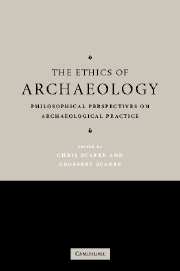Book contents
- Frontmatter
- Contents
- List of contributors
- Acknowledgements
- 1 Introduction
- PART I THE OWNERSHIP OF CULTURAL OBJECTS
- PART II ARCHAEOLOGISTS AND THE LIVING
- 6 Human subjects review and archaeology: a view from Indian country
- 7 Trust and archaeological practice: towards a framework of Virtue Ethics
- 8 Truthfulness and ‘inclusion’ in archaeology
- 9 Ethics and Native American reburials: a philosopher's view of two decades of NAGPRA
- 10 Stewardship gone astray? Ethics and the SAA
- PART III ARCHAEOLOGISTS AND THE DEAD
- PART IV THE COMMON HERITAGE OF HUMANKIND?
- References
- Index
9 - Ethics and Native American reburials: a philosopher's view of two decades of NAGPRA
Published online by Cambridge University Press: 05 June 2012
- Frontmatter
- Contents
- List of contributors
- Acknowledgements
- 1 Introduction
- PART I THE OWNERSHIP OF CULTURAL OBJECTS
- PART II ARCHAEOLOGISTS AND THE LIVING
- 6 Human subjects review and archaeology: a view from Indian country
- 7 Trust and archaeological practice: towards a framework of Virtue Ethics
- 8 Truthfulness and ‘inclusion’ in archaeology
- 9 Ethics and Native American reburials: a philosopher's view of two decades of NAGPRA
- 10 Stewardship gone astray? Ethics and the SAA
- PART III ARCHAEOLOGISTS AND THE DEAD
- PART IV THE COMMON HERITAGE OF HUMANKIND?
- References
- Index
Summary
The social sciences were apparently conceived in sin: ethics demands that we treat people as subjects; social science requires that we view them as objects. No talk of Verstehen; no degree of sympathy, can close the gap, plaster over the chasm between observer and observed, between human beings willing their ends and human beings taken as means to knowledge. But for social scientists deep into their trade, the divide between knower and known becomes a piece of the landscape, part of the natural order. The observer looks, the observed is looked at. Nothing could be more surprising to seasoned social scientists than a contretemps in which the object of study looks the observer straight in the eye.
Yet this is precisely what happened in American archaeology in November of 1990, when George Bush I signed into law the Native American Graves Protection and Repatriation Act, NAGPRA. The specimen on the slide looked up through the microscope, stood up and shook a fist in the air. NAGPRA has no preamble. No statement is made about relations between archaeologists and Native Americans, between the curators and the tribes. But there is a presumption in the text, perhaps most evident in Section 7:
7(A) If the cultural affiliation of Native American remains and associated funerary objects with a particular Indian tribe or Native Hawaiian organization is established, then the Federal agency or museum upon the request of a known lineal descendant of the Native American or of the tribe … shall expeditiously return such remains and associated funerary objects. […]
- Type
- Chapter
- Information
- The Ethics of ArchaeologyPhilosophical Perspectives on Archaeological Practice, pp. 146 - 162Publisher: Cambridge University PressPrint publication year: 2006
- 6
- Cited by



